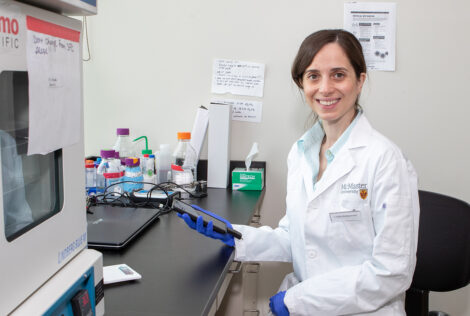

What started as a final year engineering class project at McMaster University is now an internationally recognized improved solution for the early detection of melanoma, the most dangerous form of skin cancer.
Michael Takla, Rotimi Fadiya, Prateek Mathur and Shivad Bhavsar, all graduates of McMaster’s Electrical and Biomedical Engineering program, have received the prestigious James Dyson Award and $50K to support the development of The sKan, the team’s skin cancer detection device.
The sKan was one of only two Canadian projects that made the shortlist of 20 finalists, selected from over 1,000 entries from 23 countries by a panel of Dyson engineers. Named after the renowned British inventor, designer and force behind Dyson, the home appliance technology company, the James Dyson award celebrates, encourages and inspires the next generation of design engineers.
The sKan assists physicians and the average person in detecting melanoma by creating a thermal map on the region of interest on the skin. The device is made up of 16 temperature-sensitive components called thermistors that look for areas of significant temperature difference on the skin, which may indicate risk of melanoma.
Current diagnosis methods are purely qualitative and based only on visual inspection. The sKan provides quantitative information about skin spots so that physicians can select appropriate patients for a biopsy.
“We came across the issue of skin cancer and how technology hasn’t had the same impact on its diagnosis as it has on other fields in medicine,” Mathur said. “We found research that used the thermal properties of cancerous skin tissue as a means of detecting melanoma. However, this was done using expensive lab equipment. We set out to apply the research and invent a way of performing the same assessment using a more cost-effective solution.”
The knowledge the team gained from their undergraduate engineering program, which has since evolved into the new Integrated Biomedical Engineering & Health Sciences (iBiomed) program, helped them develop and execute their idea.
“Our education on anatomy and physiology allowed us to understand the physiological concepts discussed in the research papers we used,” says Bhavsar. “We were also able to design a large portion of our electrical system based on the knowledge we gained from our Electrical & Computer Engineering courses.”
Hubert deBruin, Co-Director, iBiomed, Michael Noseworthy, Director, School of Biomedical Engineering and Raimond Wong, Associate Professor, Department of Oncology worked closely with the team as mentors while working on sKan for their final year engineering capstone project.
“They played a big role in the development of our device,” Takla said. “They provided guidance in the design, made us aware of possible sources of error and gave suggestions when we came across challenges. Dr. Noseworthy was also kind to offer us his lab space and equipment for us to complete some preliminary calibration tables.”
“I’m elated to see students from our program developing a start-up that can have direct impact on patient health,” said Noseworthy. “The Biomedical Engineering faculty at McMaster are always focusing on real life medical problems and how engineering can play a pivotal role in solutions.”
Raimond Wong, who is also chair of the Gastrointestinal Oncology Site Group at the Juravinksi Cancer Centre, assisted the team in providing a clinical perspective on the project.
“Engineering students will spend all of their time and effort to work towards finding a solution,” said Wong. “They’re willing to listen carefully to what the problem is and find all the answers they can get from all sources. It’s exciting to work with students like that.”
“We’re proud of The sKan team for winning this international award,” said Ishwar Puri, McMaster’s Dean of Engineering. “At McMaster Engineering we inspire all of our students to have big ideas through design thinking, innovation and entrepreneurship. We educate them to become engaged citizen scholars who will transform the world and solve those wicked problems our society faces.”
The next step for the sKan group is to create a new prototype that will bring them to the pre-clinical testing phase.
“Our aspirations have become a reality,” said Mathur. “Skin cancers are the most common form of cancer worldwide, and the potential to positively impact the lives of those affected is both humbling and motivating.”
The sKan team also took home $10,000 at The Forge’s Student Start-up Pitch competition in March. The team has a start-up company called PRSM Medical run out McMaster’s student incubator.
James Dyson selected sKan as the international winner from the shortlist of 20 finalists. The team travelled to the UK in late October to accept the award from Dyson at his company headquarters. The Faculty of Engineering has also received $8,500 as part of the award.
The James Dyson Award is open to current and recent design engineering students.


